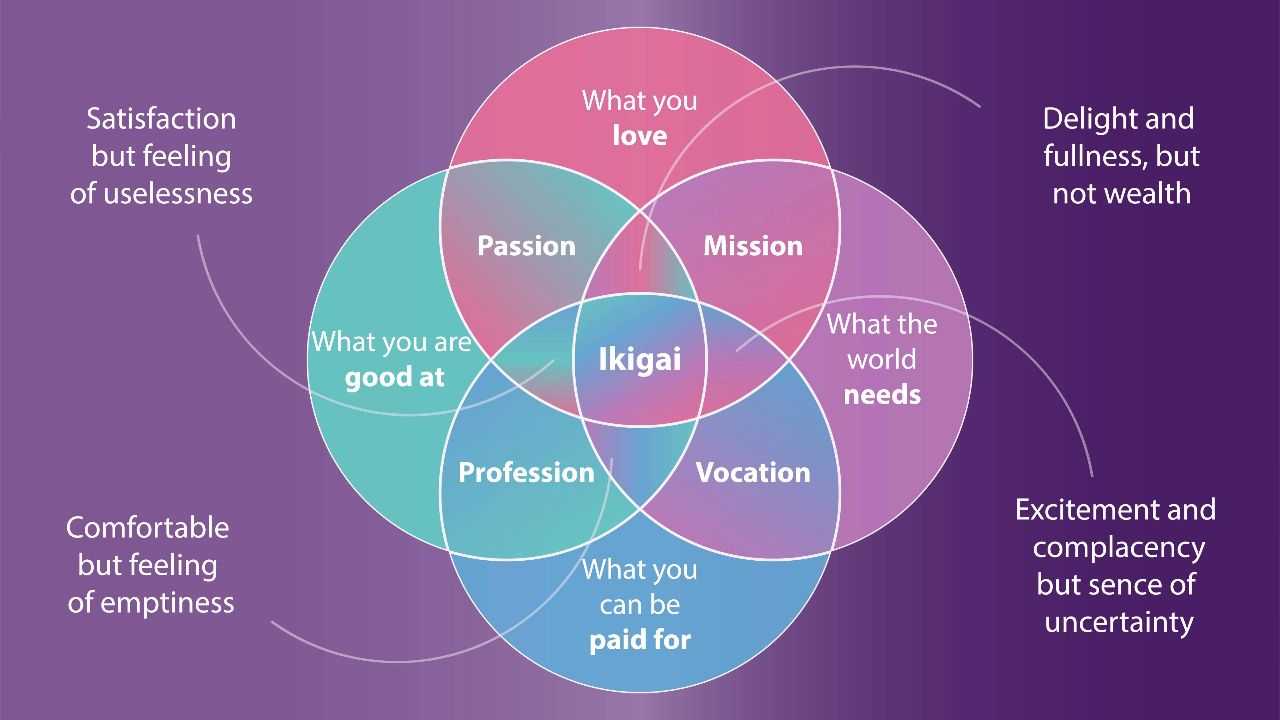
At the heart of the Japanese ideology, and seeping deeply into the Eastern philosophy, lies a concept that has been stirring curiosity worldwide: ikigai. But, what is ikigai? Loosely translated, it encapsulates the bliss of always being busy — but there’s so much more depth to it. It's not just about finding a hobby or a mere pastime; it's about discovering that sweet spot where passion, mission, profession, and vocation converge. It’s the secret sauce to a life filled with purpose and joy.
Ikigai and life are intrinsically interwoven. While the Western interpretation of purpose might lean more towards career dreams or the perfect work lifestyle, the Japanese philosophy of ikigai emphasizes a more holistic approach. It's not just about a dream career or job hopes; it’s about achieving an optimal work-leisure balance, establishing robust social relationships, and fostering an emotional connection with what you do and who you do it with.
But why is ikigai gaining such traction, especially in the West? Perhaps it's the promise of a more purposeful existence or the allure of a lifestyle that promises longevity, as evidenced by the life expectancy in regions where this philosophy is practiced, like Okinawa.
For those on the quest of finding their ikigai, the journey often starts with introspection, aligning personal aspirations, and redefining what truly brings happiness and purpose. The ikigai philosophy might be the compass you need, directing you towards a life of purpose, significance, and unadulterated joy.
Join our Newsletter
Transform your career with our personal growth insights. Get one valuable tip right in your inbox every Saturday morning.
What is Ikigai? Delving into the Essence
If one were to traverse the depth and breadth of Japanese thought, they'd encounter a concept that resonates deeply with the essence of existence: ikigai. So, when faced with the question, "What is ikigai?", the answer transcends a mere translation. Rooted in the fabric of Eastern philosophy, ikigai beautifully encapsulates the joy that arises from being meaningfully engaged — it's about seeking purpose, finding bliss, and embracing life's true calling.
At the crux of ikigai is a harmonious blend of:
- Passion: What you love and feel deeply about.
- Mission: What the world needs and where you can make a difference.
- Profession: What you can be paid for, ensuring sustenance.
- Vocation: What you're inherently skilled at, your innate talents.
This confluence is not just about achieving professional aspirations or catering to job hopes. Instead, it's a comprehensive approach to life, a compass that directs every decision and endeavor.
The Japanese philosophy behind ikigai is a testament to the culture's holistic approach to life. It's not merely about work-life balance or achieving the dream career, but a more profound understanding of self, existence, and purpose. Such a concept might seem elusive, especially to the Western understanding, but its resonance is universal. In a world chasing fleeting pleasures, ikigai offers a path to lasting joy and meaningful engagement.
Embracing the ikigai philosophy means embarking on a journey of introspection, realignment, and, most importantly, discovery. It's about finding that delicate balance where personal delight meets the world's needs, leading to a life brimming with purpose and profound joy.

The Interplay of Ikigai and Life
One cannot merely contain ikigai within the confines of a concept; it permeates our daily existence, influencing the fabric of our lifestyle and our very lifespan. Imagine a compass, not guiding direction in physical terrain but navigating the intricate journey of life. That's the role ikigai plays in the vast expanse of human existence.
The influence of ikigai doesn't just end at dictating personal passions or professional paths. It intertwines deeply with the way we lead our lives. At its core, the principle champions a harmonious existence, where each day resonates with purpose. Such a life, enriched with meaning, often leads to an enhanced life duration. The logic is simple: when you live with purpose, every moment is cherished, and health—both mental and physical—is prioritized.
Furthermore, in the modern era where the quest for the perfect work-leisure balance dominates discussions, ikigai emerges as a beacon. Instead of merely dissecting life into 'work' and 'personal' domains, the philosophy of ikigai teaches us to find joy in both, to discover a vocation that aligns with passion, and to achieve an occupational-personal equilibrium that's both fulfilling and rewarding.
In essence, to embrace ikigai is to intertwine the threads of one's mission, vocation, passion, and profession, weaving a tapestry of life that's both vibrant and harmonious.

Ikigai and Career Dreams
There's an age-old sentiment echoed by countless individuals, young and old: "I want to find a career I love." Yet, not all journeys to uncovering one's dream career are straightforward. Many find themselves meandering through various professions, seeking that elusive alignment of passion and purpose. This is where the concept of ikigai comes into play. The Japanese philosophy of ikigai doesn't just emphasize finding joy in what we do but ensures our chosen path resonates deeply with our innermost desires and aspirations.
For many, the ideal work lifestyle isn't about prestige or financial success but about feeling a profound connection to their work. It's about waking up with eagerness, with days infused with a sense of mission and delight. The ideal is to find an occupation that doesn't feel like 'work' in the traditional sense. When our professional lives align with the tenets of ikigai, the very notion of work transforms. It metamorphoses from mundane tasks to purpose-driven actions, from clock-watching hours to deeply fulfilling moments.
This connection to one's work often culminates in meaningful work lives. In the grand tapestry of existence, having impactful work lives doesn't just mean success in the boardroom. It signifies the weaving of passion, mission, vocation, and profession into one's daily life. This harmonious blend ensures not just professional satisfaction but also personal growth and contentment.
In the end, the quest for career dreams isn't just about titles or accolades. It's about unearthing one's ikigai, creating a symphony of joy, purpose, and fulfillment in the dance of life.
Western Interpretation vs Japanese Thought
In the bustling streets of modern cities, countless individuals seek a singular answer: "What is my purpose?" This quest, while universal, is often shaped and defined by cultural nuances. The Western understanding of purpose tends to be linear, closely tied to achievements, career landmarks, and tangible success metrics. Here, purpose is often synonymous with societal recognition and personal ambition.
Enter ikigai, a beacon from Eastern philosophy, illuminating a holistic understanding of life's purpose. Unlike the Western construal, the Japanese ideology encapsulated in ikigai intertwines one's passion, mission, vocation, and profession. It's not merely about what one can achieve, but how one finds harmony and balance in various life dimensions.
This contrast becomes even starker when delving deeper into Eastern philosophy. While Western ideologies often prioritize individualism and external validations, Eastern thought places emphasis on community, internal contentment, and the interconnectedness of life's facets.
In sum, while the West might ask, "What can I attain?", the Japanese ikigai whispers, "How can all elements of my life harmoniously converge?" The beauty lies in realizing there's no right or wrong, only different paths leading to the same universal quest for purpose.
Building Emotional and Social Connections with Ikigai
At the heart of our existence lies an innate desire: to form strong social connections and foster emotional bonds that stand the test of time. While the narrative of ikigai often revolves around individual purpose and passion, it’s pivotal to recognize its deep roots in communal living and shared experiences.
Imagine a life filled with meaningful conversations, laughter echoing from every corner, and the reassuring warmth of close-knit relationships. This is where the philosophy of ikigai converges with the art of building connections. Just as a tree thrives surrounded by a nurturing forest, individuals flourish within the embrace of robust social relationships.
Join our Newsletter
Transform your career with our personal growth insights. Get one valuable tip right in your inbox every Saturday morning.
These emotional linkages go beyond fleeting moments. They breathe life into our daily existence, enriching our journey towards finding ikigai. After all, purpose isn't just about personal fulfillment; it's about how our stories interweave, forming a vibrant mosaic of shared experiences and mutual growth. Through ikigai, we don't just find our path; we walk it hand in hand with others.
Ikigai Quotes: Wisdom from the East
The Japanese philosophy of ikigai isn't just an ideology; it's an eloquent expression of life's purpose, captured in profound ikigai sayings and phrases. These nuggets of wisdom distill centuries of Eastern thought into evocative words, offering glimpses into the heart of what defines ikigai.
- "To find your ikigai is to discover your passion, mission, vocation, and profession."
This quote encapsulates the essence of ikigai. It isn't about seeking one singular purpose but intertwining multiple facets of life — your passion, what the world needs, what you can be paid for, and what you're good at. These elements come together to form the rich tapestry of ikigai. - "In the heart of ikigai lies the rhythm of life, harmonizing work and leisure."
A reflection on the importance of work-leisure balance, this phrase underlines how ikigai seamlessly integrates both aspects, leading to an optimal work lifestyle. When you love what you do and find meaning in it, the lines between work and play blur. - "Ikigai is the Japanese secret to a long and happy life."
Rooted in Okinawan culture, where life expectancy is among the world's highest, this quote touches on how aligning with one's ikigai can enhance not just the quality but also the longevity of life. - "Your ikigai is hidden in every joyful moment and emotional connection."
This phrase sheds light on the emotional ties and moments of bliss that shape our existence. Every interaction, every fleeting joy, is a clue, pointing towards our deeper purpose. - "To study ikigai is to journey within, to unearth the treasures of the soul."
Beyond its external manifestations, discovering ikigai is an introspective quest. It's about aligning your inner world with the outer, finding where your deepest passions intersect with the world's needs.
Each of these ikigai citations provides a lens, allowing us to view life through the prism of Japanese thought. They remind us that purpose isn't just an abstract idea but a lived experience, a harmonious blend of our inner desires and the world around us. As we dive deep into these sayings, we're not just learning about ikigai — we're getting closer to finding our own.

Real-Life Ikigai Examples
Ikigai, with its profound roots in Japanese thought, is more than just a philosophy—it's a lived experience. But how does one truly see it in action? Here, we'll delve into relatable ikigai samples that paint a vivid picture of this intricate balance between passion, mission, profession, and vocation. By exploring how individuals from varied backgrounds found their unique ikigai, we'll also touch upon the transformative power of Personal Coaching in the quest of discovering one's ikigai.
- The Retired Artist Turned Environmentalist:
Meet Haruki, a former graphic artist who, after retirement, felt a void in his life. However, a simple walk in the park rekindled his love for nature. Merging his artistic skills with his newfound mission to save the environment, Haruki began creating informative murals about the importance of preserving natural habitats. Today, he not only pursues his passion but also fulfills a significant societal mission, epitomizing a perfect ikigai realization. - The Tech Professional Embracing Holistic Healing:
Anya, a tech-savvy software engineer, felt disconnected from her inner self. Though her job paid well, the monotonous code lines didn't resonate with her deeper calling. It was during a personal coaching session that she discovered her fascination with holistic healing. Anya then pursued courses on the same, marrying her tech skills to develop a meditation app. Her journey exemplifies how unearthing one's ikigai can transform career trajectories. - The School Teacher with a Flair for Culinary Arts:
David, a high school teacher, always enjoyed the little cooking sessions he had with his students during class breaks. Realizing his dual love for teaching and cooking, David launched weekend culinary classes for adults, providing an enriching experience that combined education with culinary delights. This ikigai instance underscores how passions can evolve into vocations when observed keenly. - The Corporate Leader Turned Mental Health Advocate:
Rhea, after a decade in corporate leadership roles, witnessed the escalating stress levels in the workspace. Utilizing her influence and resources, she initiated workplace mental health programs, ensuring employees had access to counseling and stress-relief workshops. This shift from a high-powered job to a mission-driven role showcases how finding one's ikigai can often be a journey from professional success to personal significance.
Indeed, each of these stories is a testament to the transformative essence of ikigai. While the philosophy may have its roots in Japanese ideology, its universal appeal lies in its ability to resonate with individuals across cultures and professions. And often, as highlighted, personal coaching serves as the bridge, guiding individuals towards locating their ikigai amidst life's cacophony. If these tales have ignited curiosity in you, perhaps it's time to start your own journey of introspection and discovery.
If you'd like to know more about leadership coaching, our list of The Best Leadership Coaching Quotes of All Time will help.

Strategies to Discover Your Ikigai
The journey to finding one's ikigai can be as unique and individualistic as the concept itself. However, there's no denying that certain strategies pave the way for a smoother exploration into one's true purpose and passion. It's a mix of introspection, actionable steps, and sometimes, even professional guidance. Let's delve deeper into these methodologies that can assist you in unearthing your ikigai.
- Introspection - Your Inner Compass:
Every great journey begins with a moment of reflection. To truly conceptualize your ikigai, it's pivotal to carve out quiet moments for self-reflection. Questions to ponder include: What activities make time fly for you? Which tasks, no matter how challenging, bring a sense of fulfillment? Such introspective moments can often unveil passions and missions previously overshadowed by daily routines. - Brainstorming Sessions - Mapping Out Possibilities:
Once you've pondered upon these introspective questions, it's time to brainstorm to find your ikigai. Use tools like mind maps or lists to jot down areas where your passion, mission, vocation, and profession intersect. This visual representation can be a revelation, highlighting potential paths to explore. - Aligning Personal and Professional Missions:
The balance between one's personal and professional life plays a crucial role in the ikigai journey. Business Coaching can offer invaluable insights here, especially if you're looking to align your career aspirations or business dreams with your personal ikigai. Such alignment ensures that you're not just working for a paycheck, but also for a higher purpose. - Research and Study - Tools for the Curious Mind:
Once you have a direction, delve deeper. Study to find your ikigai by researching professions, hobbies, or missions that resonate with your findings. Use online courses, webinars, or even books that focus on the subjects you're drawn to. These resources not only provide clarity but also pave the way for a structured approach to discovering your ikigai.
In essence, the voyage to discovering one's ikigai is an intricate dance between the heart and mind, between introspection and action. (If you want to explore these self-reflection questions in more detail, visit our blog post on finding life balance in 10 simple steps.) It requires patience, persistence, and sometimes a guiding hand. But at the journey's end, the realization of one's ikigai ensures a life lived with purpose, passion, and unparalleled joy. If this piques your interest, maybe it's time to embark on this transformative journey yourself.
If you're interested in exploring these self-reflection questions in more detail, visit our blog post on 45 self-reflection questions to nurture your mind, body, and soul.
Conclusion: Making Ikigai a Part of Your Life Journey
The Japanese concept of ikigai is more than just a philosophy; it's an art of living that has resonated with countless souls around the world. By anchoring our daily pursuits and endeavors to the principles of ikigai, we are provided with a compass that points towards a life imbued with purpose, passion, and fulfillment.
However, integrating the essence of ikigai into one's life doesn't happen overnight. It demands introspection, action, and often, a re-evaluation of our current paths. But the rewards are invaluable: a life led with purpose, the delight of meaningful work, and the joy of robust social relationships and emotional bonds.
For those intrigued by this fascinating interplay of life, passion, and purpose, there's a treasure trove of insights waiting for you. Explore more on ikigai, its profound implications, and myriad other topics that can shape a life worth living at the Zella Life Blog. In the journey of life, let ikigai be your guiding star, leading you to a destination of harmony, fulfillment, and unbridled joy.
Read more about: Well-being
About Remy Meraz
Remy Meraz, co-founder, and CEO of Zella Life, is a visionary leader who leveraged corporate glass ceiling challenges as a woman of color to drive systemic change.
While leading and cultivating high-performance teams from VC-backed startups to Fortune 500, she consistently faced obstacles such as inadequate mentorship, lack of psychological safety, and non-personalized training. Taking matters into her own hands, she turned to executive coaching and NLP training. This life-changing growth experience led to breaking leadership barriers and a passion for cognitive psychology.
Motivated by her experiences, she co-founded Zella Life, an innovative AI-driven coaching platform bridging the talent development gap by enhancing soft skills and emotional intelligence (EQ) in the workplace.
Her vision with Zella Life is to transform professional development into an inclusive and impactful journey, focused on the distinct needs of both individuals and organizations. She aims to promote advancement and culture change by ensuring every professional's growth is acknowledged and supported.
Today, Remy is recognized as an influential innovator, trainer, mentor, and business leader. Under her leadership, Zella Life has delivered significant measurable outcomes for numerous well-known brands. This track record of positive outcomes garnered attention and funding from Google for Startups and Pledge LA, establishing Zella Life as a pivotal force in the learning and development arena tackling and resolving fundamental talent development issues for organizations of all sizes.